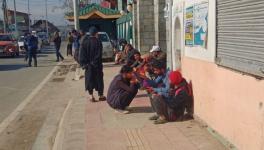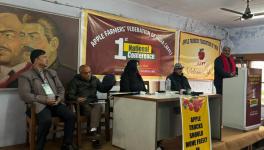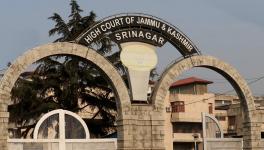Due in Delhi for a National Award, Arifa Struggles to Keep Her Business Afloat in Srinagar
Image Courtesy : The Legitimate
Srinagar: In less than a decade, Srinagar’s Arifa Jan established three manufacturing units to revive a Kashmiri traditional rug called Namda. Today, she is preparing to travel to Rashtrapati Bhawan in New Delhi where she will be conferred with the Nari Shakti Puraskar – a national award that recognises the contribution of women and their achievements.
Her nomination, however, comes at a time when 33-year-old Arifa has put down the shutters on two of her units due to the economic losses caused by the Government clampdown since August 2019. The communication blackout in the wake of the abrogation of Article 370 devastated every trader, businessman and the craftsmen of Kashmir, including Arifa, for whom the loss has been “colossal.”
Arifa, a post-graduate from the Craft Development Institute (CDI) in Srinagar, worked for a Namda revival project after completing her degree. She started her first business unit in 2012 at the Seki Dafar locality in Srinagar. Unlike Kashmiri carpets that are woven, Namda is a felted rug used widely in furnishing, especially during winters.
In addition to reviving the traditional craft, Arifa mostly engaged women and paid good wages to her artisans when the business was thriving. “I did not sell my products locally, but developed an international clientele from US, Australia, Finland and other countries over the years,” she says.
After returning from a women entrepreneurship programme by the United States State Department under which she was awarded US citizenship eligibility certificate in 2014, she established two other units in Srinagar’s Noorbagh and Nawa Kadal localities.
She says that Noorbagh was especially known for a kind of crochet work, called Ari Kaem. She had engaged as many as 52 women from these areas in the traditional embroidery work. “I had to shut both these units due to the losses. More than my loss, I feel the loss of these women which is even higher,” she says.
Arifa says she did not receive much support from any Government and even out of a loan of Rs 13 lakhs which was sanctioned during the erstwhile People’s Democratic Party (PDP) Government, she received only one installment of Rs 4 lakhs. “The internet shutdown further ended any prospects we had,” she adds.
The Kashmir Chamber of Commerce and Industries (KCCI), which Arifa is also a part of, calculated the economic loss for the erstwhile state at Rs 17,800 crores in just the first 120 days after the clampdown was enforced. In its report, the KCCI said that as many as five lakh people lost their jobs in the crisis.
Close to 70,000 people lost their livelihoods in Kashmir’s handicraft sector, a Rs 1000 crore industry which engages nearly three lakh people. It also adds to Kashmir’s cultural and historical relevance.
According to the Jammu and Kashmir’s Industries and Commerce department, there are as many as 20,000 business units in this sector. Out of them, a little over 2547 are registered as part of the organised sector while the rest are part of the unorganised sector.
“There are over one lakh people engaged with the units registered with the department,” an official of the department says.
In the 26 industrial estates across Kashmir where 2,547 plots were allotted to businessmen, only 1,444 remain functional. As many as 323 units are non-functional, 479 remain under the establishment and 191 have not been established. Areas like those in the industrial estate at Sumbal Bandipora and in the industrial estate of Kulgam, both established in year 1962, are currently occupied by security forces. Those which are functional are also on the verge of being declared “sick units” due to the losses suffered by businessmen since August 5, 2019.
In the wake of these losses, traders are also complaining that they are being targeted by financial institutions. This, they claim, is being done to harass the business community in the region. The chamber has been demanding breathing space to recover from the economic losses faced over the last six months to pay their financial debts.
The government is currently conducting roadshows across several cities in the country to bring investors to Jammu and Kashmir ahead of the much-hyped global investors summit which is expected to be held in the two capital cities of Jammu and Srinagar soon.
Businessmen and entrepreneurs in Kashmir like Arifa are currently grappling with the loss of clients and financial institutions at their back. “I did not even get half of the loan that was sanctioned under the Wakf board. Now they make threatening calls for the money. While awards are great, this is not the kind of support required to run a business in a place like Kashmir,” Arifa says.
Get the latest reports & analysis with people's perspective on Protests, movements & deep analytical videos, discussions of the current affairs in your Telegram app. Subscribe to NewsClick's Telegram channel & get Real-Time updates on stories, as they get published on our website.
























